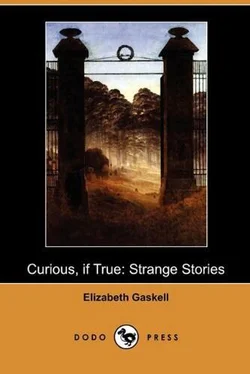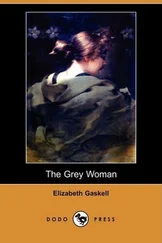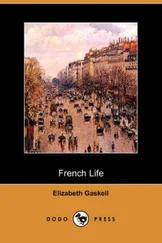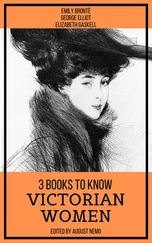The doors flew open, and I was ushered into a saloon curiously full of pale light, which did not culminate on any spot, nor proceed from any centre, nor flicker with any motion of the air, but filled every nook and corner, making all things deliciously distinct; different from our light of gas or candle, as is the difference between a clear southern atmosphere and that of our misty England.
At the first moment, my arrival excited no attention, the apartment was so full of people, all intent on their own conversation. But my friend the porter went up to a handsome lady of middle age, richly attired in that antique manner which fashion has brought round again of late years, and, waiting first in an attitude of deep respect till her attention fell upon him, told her my name and something about me, as far as I could guess from the gestures of the one and the sudden glance of the eye of the other.
She immediately came towards me with the most friendly actions of greeting, even before she had advanced near enough to speak. Then, — and was it not strange? — her words and accent were that of the commonest peasant of the country. Yet she herself looked high-bred, and would have been dignified had she been a shade less restless, had her countenance worn a little less lively and inquisitive expression. I had been poking a good deal about the old parts of Tours, and had had to understand the dialect of the people who dwelt in the Marché au Vendredi and similar places, or I really should not have understood my handsome hostess, as she offered to present me to her husband, a henpecked, gentlemanly man, who was more quaintly attired than she in the very extreme of that style of dress. I thought to myself that in France, as in England, it is the provincials who carry fashion to such an excess as to become ridiculous.
However, he spoke (still in the patois ) of his pleasure in making my acquaintance, and led me to a strange uneasy easy-chair, much of a piece with the rest of the furniture, which might have taken its place without any anachronism by the side of that in the Hôtel Cluny. Then again began the clatter of French voices, which my arrival had for an instant interrupted, and I had leisure to look about me. Opposite to me sat a very sweet-looking lady, who must have been a great beauty in her youth, I should think, and would be charming in old age, from the sweetness of her countenance. She was, however, extremely fat, and on seeing her feet laid up before her on a cushion, I at once perceived that they were so swollen as to render her incapable of walking, which probably brought on her excessive embonpoint . Her hands were plump and small, but rather coarse-grained in texture, not quite so clean as they might have been, and altogether not so aristocratic-looking as the charming face. Her dress was of superb black velvet, ermine-trimmed, with diamonds thrown all abroad over it.
Not far from her stood the least little man I had ever seen; of such admirable proportions no one could call him a dwarf, because with that word we usually associate something of deformity; but yet with an elfin look of shrewd, hard, worldly wisdom in his face that marred the impression which his delicate regular little features would otherwise have conveyed. Indeed, I do not think he was quite of equal rank with the rest of the company, for his dress was inappropriate to the occasion (and he apparently was an invited, while I was an involuntary guest); and one or two of his gestures and actions were more like the tricks of an uneducated rustic than anything else. To explain what I mean: his boots had evidently seen much service, and had been re-topped, re-heeled, re-soled to the extent of cobbler's powers. Why should he have come in them if they were not his best—his only pair? And what can be more ungenteel than poverty? Then again he had an uneasy trick of putting his hand up to his throat, as if he expected to find something the matter with it; and he had the awkward habit—which I do not think he could have copied from Dr. Johnson, because most probably he had never heard of him—of trying always to retrace his steps on the exact boards on which he had trodden to arrive at any particular part of the room. Besides, to settle the question, I once heard him addressed as Monsieur Poucet, without any aristocratic «de» for a prefix; and nearly every one else in the room was a marquis, at any rate.
I say, "nearly every one;" for some strange people had the entrée; unless, indeed, they were, like me, benighted. One of the guests I should have taken for a servant, but for the extraordinary influence he seemed to have over the man I took for his master, and who never did anything without, apparently, being urged thereto by this follower. The master, magnificently dressed, but ill at ease in his clothes, as if they had been made for some one else, was a weak-looking, handsome man, continually sauntering about, and I almost guessed an object of suspicion to some of the gentlemen present, which, perhaps, drove him on the companionship of his follower, who was dressed something in the style of an ambassador's chasseur; yet it was not a chasseur's dress after all; it was something more thoroughly old-world; boots half way up his ridiculously small legs, which clattered as he walked along, as if they were too large for his little feet; and a great quantity of grey fur, as trimming to coat, court-mantle, boots, cap—everything. You know the way in which certain countenances remind you perpetually of some animal, be it bird or beast! Well, this chasseur (as I will call him for want of a better name) was exceedingly like the great Tom-cat that you have seen so often in my chambers, and laughed at almost as often for his uncanny gravity of demeanour. Grey whiskers has my Tom—grey whiskers had the chasseur: grey hair overshadows the upper lip of my Tom—grey mustachios hid that of the chasseur. The pupils of Tom's eyes dilate and contract as I had thought cats' pupils only could do, until I saw those of the chasseur. To be sure, canny as Tom is, the chasseur had the advantage in the more intelligent expression. He seemed to have obtained most complete sway over his master or patron, whose looks he watched, and whose steps he followed, with a kind of distrustful interest that puzzled me greatly.
There were several other groups in the more distant part of the saloon, all of the stately old school, all grand and noble, I conjectured from their bearing. They seemed perfectly well acquainted with each other, as if they were in the habit of meeting. But I was interrupted in my observations by the tiny little gentleman on the opposite side of the room coming across to take a place beside me. It is no difficult matter to a Frenchman to slide into conversation, and so gracefully did my pigmy friend keep up the character of the nation, that we were almost confidential before ten minutes had elapsed.
Now I was quite aware that the welcome which all had extended to me, from the porter up to the vivacious lady and meek lord of the castle, was intended for some other person. But it required either a degree of moral courage, of which I cannot boast, or the self-reliance and conversational powers of a bolder and cleverer man than I, to undeceive people who had fallen into so fortunate a mistake for me. Yet the little man by my side insinuated himself so much into my confidence, that I had half a mind to tell him of my exact situation, and to turn him into a friend and an ally.
"Madame is perceptibly growing older," said he, in the midst of my perplexity, glancing at our hostess.
"Madame is still a very fine woman," replied I.
"Now, is it not strange," continued he, lowering his voice, "how women almost invariably praise the absent, or departed, as if they were angels of light, while as for the present, or the living" — here he shrugged up his little shoulders, and made an expressive pause. "Would you believe it! Madame is always praising her late husband to monsieur's face; till, in fact, we guests are quite perplexed how to look: for, you know, the late M. de Retz's character was quite notorious, — everybody has heard of him." All the world of Touraine, thought I, but I made an assenting noise.
Читать дальше












